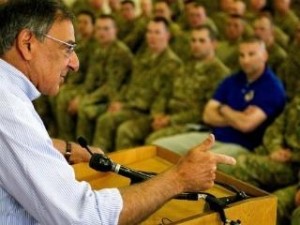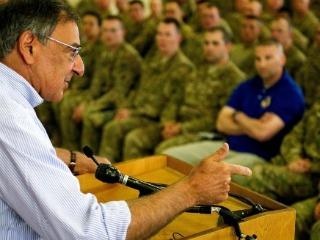
“The Iranians need to understand that the United States and the international community are going to hold them directly responsible for any disruption of shipping in that region by Iran or, for that matter, by its surrogates,” said United States Secretary of Defense Leon Panetta in a press conference at the Pentagon on Wednesday.
“The United States is fully prepared for all contingencies. We’ve invested in capabilities to ensure that the Iranian attempt to close down shipping in the Gulf is something that we are going to be able to defeat if they make that decision to do that,” Panetta told reporters in the joint conference with Phillip Hammond, the UK Secretary of State for Defense.
The strong words from the US come after Iran’s state run news agency on Sunday quoted Major General Hassan Firouzabadi saying that the country is prepared and capable of closing the Strait of Hormuz in response to sanctions from the West.
The Major said, “We have a plan for closing the Strait of Hormuz, but executing the plan needs the permission of the Supreme Leader.” He slammed Western accusations that Iran may just be posturing, “They allege that we are bluffing in a bid to appease themselves. Of course, we don’t want to block the Strait of Hormuz, but we have a plan for closing it, which is a clever and wise one.”
The Strait of Hormuz has been under close scrutiny this past year as Iran and the West push back and forth concerning the oversight of Iran’s nuclear programme. The strait is so important because it is the only sea outlet for the ports of Iraq, Kuwait, Bahrain, and Qatar who export a combined nearly 6 million bbl per day.
It is also the access point to Saudi Arabia’s oil-rich northeastern coast. Iran controls both shores of the narrow passage and a threat to stop shipping is seen as one of the most feared economic and political weapon at Iran’s disposal.
“I believe that the threat from Iran to close the Strait of Hormuz is a rather empty one,” claims Cristian Koch, Director of International Studies at the Gulf Research Center located in the UAE. “For one, they do not have the capability to actually carry through on their threat and the US navy has made it clear that they will not allow Iran to do so.
Iran also itself depends on this export route and a further curtailment of their energy exports would be devastating to the Iranian economy. It is simply an intimidation technique used by Iran to scare its Arab Gulf neighbors.”
These Gulf neighbors have responded to this intimidation. Saudi Arabia announced the reopening of a pipeline builtto avoid Iranian interference during the Iran-Iraq war.
On Sunday the United Arab Emirates pumped the first batch of oil through an over-ground pipeline that connects the Persian Gulf to the Gulf of Oman, with sea access to ports around the world. This land route allows oil shipments to avoid the Strait of Hormuz entirely.
“The opening of the pipeline in the UAE is absolutely critical as it will allow the UAE to export as much as two-thirds of their oil through this new pipeline,” Koch said. “The decision to build this pipeline is a direct results of the threats that have been pronounced by Iran and therefore the Iranians have been shooting themselves in the foot by forcing its Arab Gulf neighbors to look for alternatives,” he added.
Kristian Coates Ulrichsen, Director of the Kuwait Program at the London School of Economics, agrees that these land routes are important developments in the contentious Gulf region.
While they do not altogether remove reliance on the strait, they do send a strong message, Ulrichsen said.
“The recent moves do show that Saudi Arabia and the UAE are pushing back against Iranian threats,” Ulrichsen said, “and trying to seize the initiative not just in the war of words in the Gulf, but through actual actions as well.”




